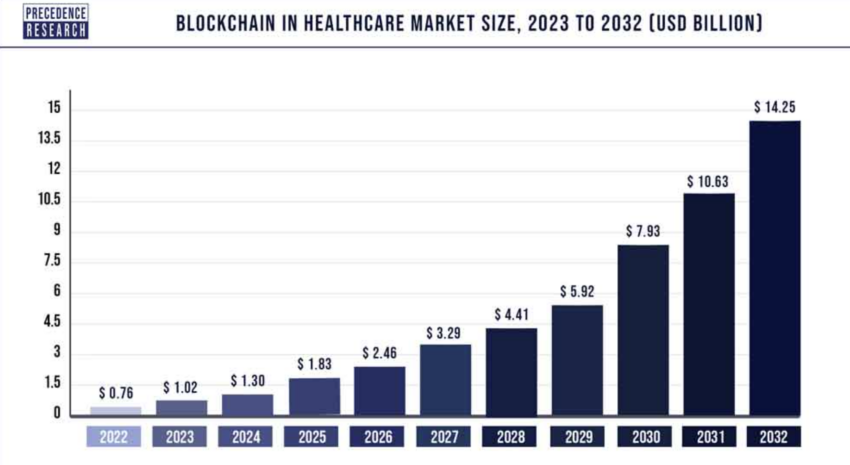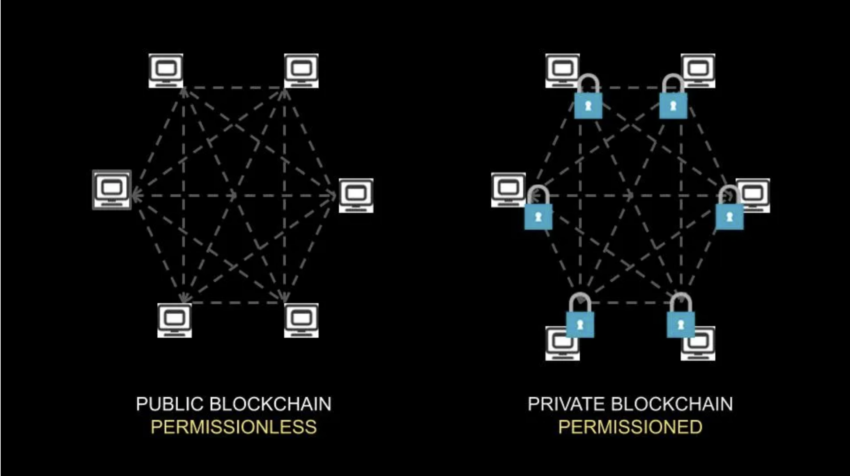Blockchain is a distributed ledger technology that records data in immutable blocks across a network of computers (nodes). The distributed database reshapes how different industries manage, store, and record data. There are different iterations of these networks, with the most prominent being public and private blockchains.
Read on to learn about private blockchains, their features, how they work, and their benefits and drawbacks in 2024.
What is a private blockchain?
A private blockchain, also known as a permissioned blockchain, is a distributed ledger in which a company or organization controls who can access the database, run nodes, and participate in consensus.
These networks are only accessible to authorized chosen parties whose identities are verified by the controlling group. They operate within an exclusive and secure environment of companies or groups that prioritize information privacy.
Key features of private blockchains

Private blockchains feature the same attributes as other blockchains, including distributed ledger technology (DLT), consensus, immutability, and transparency. However, there are additional features that set private blockchains apart. Let’s take a look.
Permissioned access
Private blockchains are only accessible to authorized participants. As such, the blockchain’s controlling entity decides who can join the network, can restrict access to data, and knows the identities of all the participants. Moreover, the controlling entity can also override or delete records.
Enhanced security
Private blockchains are very selective on participants. The data and information related to participants have limited visibility, and confidentiality is paramount. Notably, onboarding participants based on invitation reduces the risk of malicious actors getting access to the network and enhances the participants’ trust.
Controlled consensus
Private blockchains use consensus mechanisms that fit the participants’ needs. The controlling organization sets customized rules on operation, governance, and decision-making. A private blockchain consensus follows a structured process with pre-selected validators, often chosen by the controlling group.
How does a private blockchain work?

A group or organization runs these permissioned blockchains. A protocol is in place to guarantee the integrity of data and validate the transactions added to the network. The process of adding data to the network has many moving parts.
Let’s look at some of them.
Nodes and network setup
Nodes are devices that run the network software and can create, validate, and store blockchain data. The network software is either licensed by a software company or built by the controlling entity.
The private blockchain is made up of a network of nodes. The controlling organization or group runs this network. The organization running the private blockchain can delegate validator nodes to participants to allow them to validate transactions before they are recorded on the ledger. Other participants can get nodes, but they cannot validate transactions. Notably, the nodes hosted by the controlling entity have a record of the entire ledger. Meanwhile, participant nodes only hold parts of the ledger they can access.
Most private blockchains have a software application (app) that connects participants to the network and allows them to make transactions.
Consensus mechanisms used
Consensus mechanisms in blockchain allow the network to verify transactions and reach an agreement on the state of the ledger. Every private blockchain has a consensus mechanism that meets the participants’ needs and the controlling entity’s requirements.
In a private blockchain, the authority of the controlling organization is not enough. A consensus mechanism is necessary to legitimize the data added to the ledger.
Consensus mechanisms enhance private blockchains’ privacy and security by restricting who can approve transactions and add data to the blockchain. The organization running the blockchain pre-selects validators to participate in the consensus, ensuring sensitive participant data is protected during validation.
Using pre-selected validators who are known to the organization ensures accountability. The transactions are grouped in blocks, validated by pre-selected nodes that find the hash function, and added to the blockchain.
Examples of private blockchain consensus mechanisms include proof-of-authority, Federated Byzantine Agreement (FBA), proof-of-importance, and proof-of-elapsed-time.
Data privacy and security measures
Private blockchains limit participants to those verified and authorized by the controlling organization. Because every participant is approved by the running organization, they have a higher degree of data privacy than other blockchain networks. As a consequence, the chances of malicious actors on the network are reduced.
The controlling organization also restricts what data participants can access. Enforcing access rights on a ledger carrying sensitive information ensures that user privacy is upheld and only trusted participants can view the data.
Advantages of private blockchains
Private blockchains are customizable distributed ledgers that prioritize privacy and security. Let’s examine other advantages of this emerging technology.
Data control
Private blockchains offer selective access rights to the network, and not all participants can view the full ledger. The controlling organization has the authority to limit the data participants can access and protect user data from the public. It verifies all the participants’ identities, which increases the level of trust in the network.
Scalability
Private blockchains have fewer participants and are more efficient than public blockchains. Their controlled nature and limited nodes facilitates higher throughput and faster transactions. Fewer nodes ensure that private blockchains can reach consensus fast and implement necessary changes, improving scalability.
Cost efficiency
Private blockchains have lower transaction fees as they have limited participants and high throughput. Permissioned blockchains don’t increase transaction fees based on demand. Instead, they maintain a low and predictable price point. The network is also more cost-effective; it can be operated with few resources and can use existing infrastructure.
Use cases of private blockchains

Private blockchains have the potential to iron out inefficiencies in many traditional industries. A shared ledger can streamline information processing and communication between shareholders. The blockchain’s controlled nature ensures that participants are verified and receive restricted access to data.
Let’s look at some use cases of permissioned blockchains in different industries.
Enterprise applications
Private blockchains’ unique features offer a transformative approach to recording and managing data for business-to-business (B2B) and business-to-consumer (B2C) enterprises.
Permissioned blockchains are intrinsically private. Only authorized participants can access the ledger. The closed system ensures that sensitive business information is kept secure and participants are vetted before gaining access to the network. Private networks can be customized to the business’s needs and can be tailored to fit the enterprises’ requirements and goals. Enterprises can operate private blockchain using existing infrastructure, which minimizes disruption during adoption.
Supply chain management
Private blockchains can revolutionize supply chain management by providing security, accountability, and transparency of data during the movement of goods from production to consumer.
Permissioned blockchains can streamline the logistics process and offer data validation and transparency through a shared ledger with records of all transactions. This offers a single source of truth for all stakeholders in the network, increasing trust among participants.
Finance and banking
Private blockchain networks are reshaping the banking industry’s technology infrastructure by reducing reliance on third parties and lowering transaction costs. Blockchain technology can streamline cross-border transactions and automate complex commands through smart contracts. The sector is booming, and the number of B2B cross-border transactions finalized on blockchain is expected to increase dramatically in the coming years. Juniper Finance estimates that by 2025, the number of B2B cross-border transactions on the blockchain will reach 745 million and, in 2024, make up 11% of total B2B international payments.

The shared ledger can create accountability and promote transparency between all parties involved in financial agreements.
Healthcare
The healthcare industry deals with sensitive medical data and a large number of patient records that need to be stored securely and recorded accurately. Private blockchains’ privacy and security features can be customized to store immutable records and give authorized parties selective access to patient information.
The distributed ledger can facilitate more collaborative patient care by providing medical practitioners with updated medical records that are chronologically organized.

Another nascent yet fast-expanding market, the size of the blockchain in healthcare market is expected to grow at a CAGR of 34.02% between 2023 and 2032, as per Precedence Research data.
“Open, public, and permissionless are ideals that Bitcoin was built on. These are the features you would want for an open, transparent monetary system that anyone in the world can participate in. At the same time, private blockchains have a lot of use cases.
For example, for ERP software in manufacturing, it doesn’t make sense to use a public blockchain where anyone can see the movement of goods. In that instance, a private and permissioned blockchain makes more sense.
CEO of Samara Asset Group and host of the Proof of Words podcast, Patrick Lowry, told BeInCrypto.
Challenges and limitations of private blockchains
Private blockchains come with some drawbacks. Let’s look at some of them.
Centralization concerns
Private blockchains are centralized networks that are under the control of an organization or group. The full ledger is only accessible to the controlling organization, and in some cases, the central body can alter or delete data on the blockchain. Blockchain centralization can create concerns about data integrity.
Integration issues
Integrating private blockchains into existing industries is not a clear-cut process since the technology faces regulatory ambiguity and a lack of standardization. Blockchain technology has no clear regulatory frameworks and no standardized protocol. Most projects use standalone consensus and programming language for their network, which reduces blockchain interoperability.
Private blockchains can also be incompatible with legacy systems.
Limited transparency
Participants in a private blockchain have limited access to data on the network. The controlling organization selects who can add information to the blockchain and restricts participants from viewing the full ledger.
Private blockchains vs. public blockchains

The biggest differences between these two network types are related to decentralization, privacy, accessibility, and efficiency. Public blockchains are decentralized with no central authority, and nodes are responsible for maintaining the network. Meanwhile, private blockchains are partially decentralized, with a central authority managing the network. Public blockchains are at risk for a 51% attack, while private network centralization eliminates that risk.
Private blockchains focus on maintaining participant privacy and protecting data from unauthorized actors, whereas public blockchains are fully transparent, and the information on the ledger is open to everyone. Public blockchains are accessible to anyone, while private blockchains are only accessible to verified and authorized participants. Permissioned blockchains have limited participants, which increases transaction throughput and speed, whereas public blockchains have millions of participants, which slows down consensus and transaction speed.
Potential to reshape industry
Private blockchain networks have the potential to reshape industries and revolutionize how companies manage and record data. The ledger’s features of transparency, security and privacy can fix flaws across finance, supply chain management, and healthcare. The technology is flexible and still evolving, leaving room to eventually overcome its challenges and limitations
Leveraging permissioned blockchain technology can give enterprises a competitive edge by gaining the trust of stakeholders and increasing company revenue.
Frequently asked questions
What is a private blockchain example?
Why do we use private blockchain?
What is the difference between a private and public blockchain?
What is a private key in blockchain?
How to create a private blockchain?
What are the benefits of using a private blockchain?
Can anyone join a private blockchain network?
What are some real-world examples of private blockchain use?
Are private blockchains more secure than public blockchains?
Trusted
Disclaimer
In line with the Trust Project guidelines, the educational content on this website is offered in good faith and for general information purposes only. BeInCrypto prioritizes providing high-quality information, taking the time to research and create informative content for readers. While partners may reward the company with commissions for placements in articles, these commissions do not influence the unbiased, honest, and helpful content creation process. Any action taken by the reader based on this information is strictly at their own risk. Please note that our Terms and Conditions, Privacy Policy, and Disclaimers have been updated.




